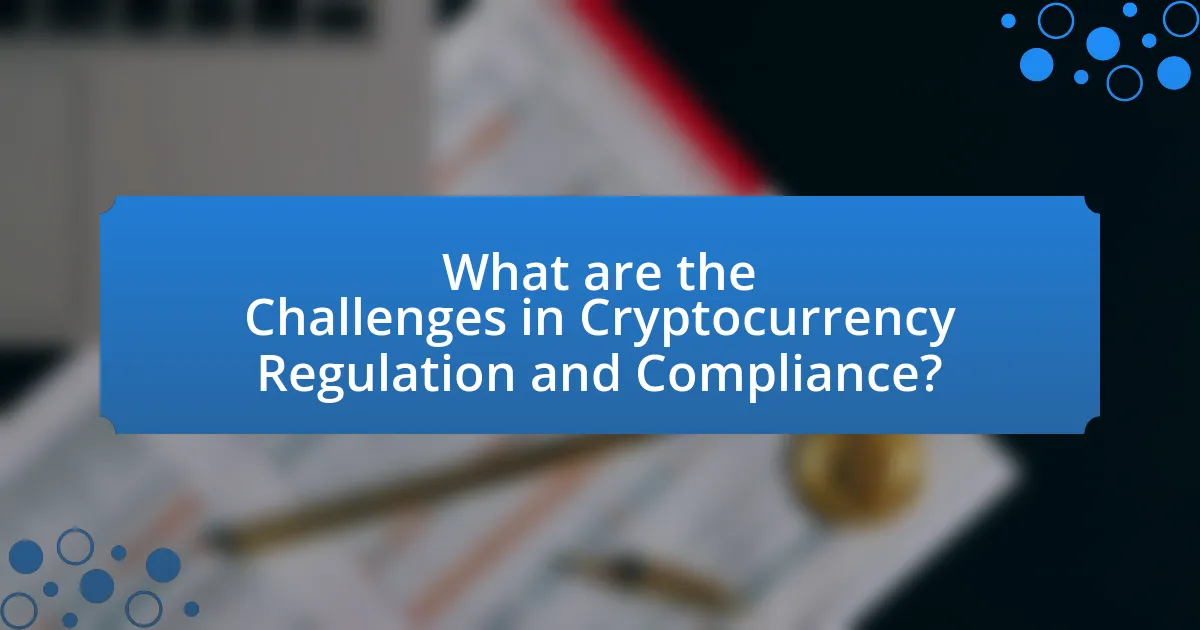The article focuses on future trends in cryptocurrency regulation and compliance, highlighting the shift towards comprehensive frameworks that prioritize consumer protection and financial stability. It discusses how governments are adopting regulatory measures to address security and fraud concerns, with an emphasis on anti-money laundering (AML) and know-your-customer (KYC) requirements. The piece also examines the influence of international agreements on local regulations, the role of financial institutions in compliance, and the impact of technological advancements such as blockchain and smart contracts. Additionally, it addresses the challenges regulators face, including the rapid pace of technological change and the decentralized nature of cryptocurrencies, while outlining best practices for businesses to navigate the evolving regulatory landscape.

What are the Future Trends in Cryptocurrency Regulation and Compliance?
Future trends in cryptocurrency regulation and compliance indicate a shift towards more comprehensive frameworks that prioritize consumer protection and financial stability. Regulatory bodies worldwide are increasingly focusing on establishing clear guidelines for digital assets, with an emphasis on anti-money laundering (AML) and know-your-customer (KYC) requirements. For instance, the Financial Action Task Force (FATF) has recommended that countries implement regulations that align with these standards, leading to a more unified global approach. Additionally, the rise of decentralized finance (DeFi) is prompting regulators to adapt existing laws to address the unique challenges posed by these platforms, ensuring that they are not used for illicit activities. As a result, we can expect enhanced collaboration between governments and industry stakeholders to create a balanced regulatory environment that fosters innovation while safeguarding the financial system.
How are governments approaching cryptocurrency regulation?
Governments are increasingly adopting a regulatory framework for cryptocurrency to address concerns related to security, fraud, and financial stability. For instance, countries like the United States have implemented guidelines through agencies such as the Securities and Exchange Commission (SEC) and the Commodity Futures Trading Commission (CFTC) to classify cryptocurrencies and enforce compliance with existing financial laws. Similarly, the European Union is working on the Markets in Crypto-Assets (MiCA) regulation, which aims to create a comprehensive regulatory framework for digital assets across member states. These approaches reflect a global trend towards formalizing the legal status of cryptocurrencies, ensuring consumer protection, and mitigating risks associated with their use.
What factors influence regulatory decisions in different countries?
Regulatory decisions in different countries are influenced by factors such as economic conditions, political stability, cultural attitudes towards technology, and existing legal frameworks. Economic conditions dictate the need for regulation to protect consumers and ensure market stability, while political stability affects the willingness of governments to implement and enforce regulations. Cultural attitudes towards technology can shape public perception and acceptance of cryptocurrencies, influencing regulatory approaches. Additionally, existing legal frameworks provide a foundation for how new regulations are developed and integrated, as seen in countries like the United States, where the regulatory landscape is shaped by a combination of federal and state laws.
How do international agreements impact local regulations?
International agreements significantly influence local regulations by establishing frameworks that countries adopt to ensure compliance with global standards. For instance, treaties like the Financial Action Task Force (FATF) recommendations compel nations to implement anti-money laundering (AML) and counter-terrorism financing (CTF) measures, which directly shape local laws governing cryptocurrency transactions. As a result, jurisdictions often modify their regulatory approaches to align with these international norms, ensuring they remain competitive and compliant in the global market. This alignment is evidenced by the increasing number of countries that have enacted legislation reflecting FATF guidelines, thereby enhancing their regulatory environments for cryptocurrencies.
What role do financial institutions play in cryptocurrency compliance?
Financial institutions play a crucial role in cryptocurrency compliance by implementing anti-money laundering (AML) and know your customer (KYC) regulations. These institutions are responsible for monitoring transactions, verifying customer identities, and reporting suspicious activities to regulatory authorities. For instance, in 2021, the Financial Action Task Force (FATF) updated its guidelines to include virtual assets, emphasizing that financial institutions must treat cryptocurrency transactions similarly to traditional financial transactions to prevent illicit activities. This compliance framework helps ensure that cryptocurrencies are used within legal parameters, thereby fostering trust and stability in the financial system.
How are banks adapting to the rise of cryptocurrencies?
Banks are adapting to the rise of cryptocurrencies by integrating blockchain technology, offering cryptocurrency-related services, and enhancing regulatory compliance measures. Many banks are developing their own digital currencies or partnering with fintech companies to facilitate cryptocurrency transactions, which allows them to remain competitive in a rapidly evolving financial landscape. For instance, JPMorgan launched its own digital currency, JPM Coin, to streamline cross-border payments. Additionally, banks are investing in compliance technologies to meet regulatory requirements, as seen in the increased hiring of compliance officers and the implementation of advanced monitoring systems to detect fraudulent activities associated with cryptocurrencies. This proactive approach helps banks mitigate risks while embracing the opportunities presented by the growing cryptocurrency market.
What compliance measures are being implemented by financial institutions?
Financial institutions are implementing several compliance measures to adhere to regulatory requirements, particularly in the context of cryptocurrency. These measures include enhanced Know Your Customer (KYC) protocols, which require institutions to verify the identity of their clients to prevent fraud and money laundering. Additionally, financial institutions are adopting Anti-Money Laundering (AML) practices that involve monitoring transactions for suspicious activities and reporting them to relevant authorities.
Moreover, institutions are increasingly utilizing blockchain analytics tools to track cryptocurrency transactions, ensuring transparency and compliance with regulations. According to a report by the Financial Action Task Force (FATF), these measures are essential for mitigating risks associated with digital assets and maintaining the integrity of the financial system.
What technological advancements are shaping cryptocurrency regulation?
Technological advancements such as blockchain analytics, smart contracts, and artificial intelligence are significantly shaping cryptocurrency regulation. Blockchain analytics tools enable regulators to trace transactions and identify illicit activities, enhancing transparency and compliance. Smart contracts automate regulatory processes, ensuring that transactions adhere to legal requirements without manual intervention. Artificial intelligence aids in risk assessment and fraud detection, allowing regulators to respond swiftly to emerging threats. These advancements collectively improve the effectiveness of regulatory frameworks, as evidenced by the increasing adoption of such technologies by regulatory bodies worldwide.
How is blockchain technology influencing compliance practices?
Blockchain technology is significantly influencing compliance practices by enhancing transparency and traceability in transactions. This technology allows for immutable records that can be audited in real-time, thereby reducing the risk of fraud and ensuring adherence to regulatory requirements. For instance, financial institutions are increasingly adopting blockchain to streamline Know Your Customer (KYC) processes, as it enables secure sharing of verified customer data across platforms. According to a report by Deloitte, 40% of financial services firms are exploring blockchain for compliance purposes, indicating a strong trend towards its integration in regulatory frameworks.
What role do smart contracts play in regulatory frameworks?
Smart contracts serve as automated, self-executing agreements that enforce compliance with regulatory frameworks in cryptocurrency. They facilitate transparency and accountability by encoding rules and conditions directly into the blockchain, which reduces the potential for fraud and enhances trust among parties. For instance, smart contracts can automatically execute transactions when predefined conditions are met, ensuring adherence to regulatory requirements without the need for intermediaries. This capability aligns with regulatory goals of reducing risk and increasing efficiency in financial transactions, as evidenced by the European Union’s proposed regulations that emphasize the use of technology to enhance compliance measures.

What are the Challenges in Cryptocurrency Regulation and Compliance?
The challenges in cryptocurrency regulation and compliance primarily stem from the rapid evolution of technology, lack of standardized regulations, and the decentralized nature of cryptocurrencies. Regulatory bodies struggle to keep pace with innovations such as decentralized finance (DeFi) and non-fungible tokens (NFTs), which complicate the establishment of effective oversight. Additionally, the absence of a unified regulatory framework across jurisdictions leads to inconsistencies, making compliance difficult for businesses operating internationally. For instance, the Financial Action Task Force (FATF) has issued guidelines, but implementation varies significantly among countries, creating a patchwork of regulations. Furthermore, the anonymity associated with many cryptocurrencies poses risks related to money laundering and fraud, challenging regulators to balance innovation with consumer protection and financial stability.
What are the main obstacles faced by regulators?
The main obstacles faced by regulators include the rapid pace of technological innovation, the complexity of decentralized systems, and the lack of standardized frameworks. Regulators struggle to keep up with advancements in blockchain technology and cryptocurrency, which evolve faster than regulatory processes can adapt. Additionally, the decentralized nature of cryptocurrencies complicates jurisdictional enforcement, making it difficult to apply existing laws effectively. The absence of uniform regulations across different jurisdictions further exacerbates these challenges, leading to regulatory arbitrage where entities exploit gaps in oversight.
How does the decentralized nature of cryptocurrencies complicate regulation?
The decentralized nature of cryptocurrencies complicates regulation by creating challenges in identifying responsible parties and enforcing compliance. Unlike traditional financial systems, where centralized institutions can be held accountable, cryptocurrencies operate on a peer-to-peer network without a central authority, making it difficult for regulators to impose rules and monitor transactions effectively. For instance, the anonymity provided by blockchain technology allows users to transact without revealing their identities, which hinders law enforcement efforts to trace illicit activities. Additionally, the global nature of cryptocurrencies means that regulations in one jurisdiction may not be applicable or enforceable in another, leading to regulatory arbitrage where users exploit less stringent regulations. This complexity necessitates innovative regulatory approaches that can adapt to the unique characteristics of decentralized systems.
What challenges arise from the rapid pace of technological change?
The rapid pace of technological change presents several challenges, including regulatory lag, cybersecurity risks, and the need for continuous skill development. Regulatory lag occurs as existing laws struggle to keep up with innovations, leading to gaps in compliance frameworks that can hinder the effective governance of emerging technologies like cryptocurrencies. Cybersecurity risks escalate as new technologies often introduce vulnerabilities that can be exploited, resulting in financial losses and breaches of sensitive data. Additionally, the workforce must continuously adapt to new tools and systems, necessitating ongoing education and training to ensure that employees possess the necessary skills to navigate these advancements effectively. These challenges highlight the complexities that arise in managing the intersection of technology and regulation in the cryptocurrency space.
How do compliance costs affect cryptocurrency businesses?
Compliance costs significantly impact cryptocurrency businesses by increasing operational expenses and potentially limiting market entry for new players. These costs arise from regulatory requirements such as Know Your Customer (KYC) and Anti-Money Laundering (AML) protocols, which necessitate investments in technology and personnel. For instance, a study by the Cambridge Centre for Alternative Finance found that compliance costs can account for up to 20% of a cryptocurrency firm’s total expenses. This financial burden can deter startups from entering the market and may lead established firms to reduce their service offerings or increase fees for consumers, ultimately affecting market competitiveness and innovation.
What are the financial implications of compliance for startups?
Compliance for startups in the cryptocurrency sector incurs significant financial implications, including costs associated with regulatory adherence, legal consultations, and potential penalties for non-compliance. Startups must allocate resources for compliance programs, which can range from hiring compliance officers to investing in technology for monitoring transactions. For instance, a study by the Cambridge Centre for Alternative Finance indicates that compliance costs can account for up to 10% of a startup’s operational budget, particularly in highly regulated environments. Additionally, failure to comply can lead to hefty fines; for example, the Financial Crimes Enforcement Network (FinCEN) has imposed fines exceeding $100 million on companies for violations. Thus, the financial burden of compliance is substantial and can impact a startup’s viability and growth trajectory.
How can businesses balance compliance with innovation?
Businesses can balance compliance with innovation by integrating regulatory frameworks into their innovation processes. This approach ensures that new products and services meet legal standards while fostering creativity. For instance, companies can adopt agile compliance strategies that allow for rapid adaptation to regulatory changes, enabling them to innovate without risking non-compliance. A study by Deloitte highlights that organizations employing such strategies can reduce compliance costs by up to 30% while simultaneously increasing their market responsiveness. By leveraging technology, such as compliance automation tools, businesses can streamline their compliance efforts, allowing more resources to be allocated towards innovative initiatives.
What are the risks of inadequate regulation?
Inadequate regulation poses significant risks, including increased fraud, market manipulation, and systemic instability. Without proper oversight, bad actors can exploit loopholes, leading to financial losses for investors and undermining trust in the cryptocurrency market. For instance, the lack of regulatory frameworks contributed to the collapse of major exchanges like Mt. Gox in 2014, resulting in the loss of approximately 850,000 Bitcoins, valued at around $450 million at that time. Furthermore, inadequate regulation can hinder innovation by creating an uncertain environment for legitimate businesses, ultimately stifling growth in the cryptocurrency sector.
How can lack of regulation lead to market manipulation?
Lack of regulation can lead to market manipulation by creating an environment where unethical practices can thrive without oversight. In unregulated markets, individuals or entities can engage in activities such as pump-and-dump schemes, where they artificially inflate the price of an asset to sell at a profit, leaving other investors with losses. Historical examples, such as the 2017 cryptocurrency market surge, illustrate how the absence of regulatory frameworks allowed for rampant speculation and manipulation, resulting in significant market volatility and investor harm. This demonstrates that regulation is essential to ensure fair trading practices and protect investors from fraudulent activities.
What are the potential consequences for consumers?
The potential consequences for consumers in the context of future trends in cryptocurrency regulation and compliance include increased protection against fraud and market manipulation. As regulatory frameworks evolve, consumers may benefit from enhanced transparency and accountability from cryptocurrency exchanges and service providers, which can reduce the risk of scams. For instance, regulations may require exchanges to implement robust Know Your Customer (KYC) and Anti-Money Laundering (AML) practices, thereby safeguarding consumer assets. Additionally, consumers could face limitations on their trading activities due to stricter compliance measures, which may affect their ability to engage freely in the cryptocurrency market. Overall, while regulations aim to protect consumers, they may also impose constraints that could impact their trading flexibility and access to certain cryptocurrencies.

What are the Best Practices for Navigating Cryptocurrency Regulation and Compliance?
The best practices for navigating cryptocurrency regulation and compliance include staying informed about local and international regulations, implementing robust KYC (Know Your Customer) and AML (Anti-Money Laundering) procedures, and engaging with legal experts. Staying informed is crucial as regulations can vary significantly across jurisdictions; for instance, the Financial Action Task Force (FATF) provides guidelines that many countries adopt. Implementing KYC and AML procedures helps mitigate risks associated with fraud and money laundering, which are critical for maintaining compliance and building trust with users. Engaging with legal experts ensures that organizations can adapt to evolving regulations and avoid potential legal pitfalls, as seen in cases where companies faced penalties for non-compliance.
How can businesses stay informed about regulatory changes?
Businesses can stay informed about regulatory changes by subscribing to industry newsletters, attending relevant conferences, and engaging with legal experts. These methods provide timely updates on evolving regulations, particularly in the cryptocurrency sector, where changes can occur rapidly. For instance, organizations like the Financial Action Task Force (FATF) regularly publish guidelines that impact cryptocurrency compliance, making their reports essential for businesses to monitor. Additionally, utilizing regulatory technology (RegTech) solutions can automate the tracking of changes in laws and regulations, ensuring that businesses remain compliant and informed.
What resources are available for tracking cryptocurrency regulations?
Resources available for tracking cryptocurrency regulations include government websites, legal databases, and specialized news platforms. Government websites, such as the U.S. Securities and Exchange Commission (SEC) and the Financial Action Task Force (FATF), provide official updates on regulatory changes. Legal databases like Westlaw and LexisNexis offer comprehensive access to legal documents and case law related to cryptocurrency. Additionally, news platforms such as CoinDesk and CoinTelegraph report on regulatory developments and trends in the cryptocurrency space, ensuring stakeholders stay informed about compliance requirements and changes in legislation.
How can companies engage with regulators effectively?
Companies can engage with regulators effectively by establishing open lines of communication and actively participating in regulatory discussions. This involves regularly attending public hearings, submitting comments on proposed regulations, and collaborating with industry associations to represent collective interests. For instance, companies in the cryptocurrency sector can join organizations like the Blockchain Association, which advocates for favorable regulatory frameworks. Engaging in these activities not only helps companies stay informed about regulatory changes but also allows them to influence policy development, ensuring that regulations are practical and conducive to innovation.
What compliance strategies should businesses adopt?
Businesses should adopt a multi-faceted compliance strategy that includes robust risk assessment, continuous monitoring, employee training, and collaboration with regulatory bodies. A comprehensive risk assessment helps identify vulnerabilities specific to cryptocurrency operations, allowing businesses to implement targeted controls. Continuous monitoring of transactions and activities ensures adherence to regulations and helps detect suspicious behavior in real-time. Employee training programs are essential for keeping staff informed about compliance requirements and best practices, which is crucial given the rapidly evolving regulatory landscape. Additionally, collaboration with regulatory bodies fosters transparency and can provide businesses with insights into upcoming regulatory changes, enhancing their ability to adapt. These strategies are supported by the increasing emphasis on compliance in the cryptocurrency sector, as evidenced by the growing number of regulatory frameworks being established globally.
How can businesses implement robust compliance programs?
Businesses can implement robust compliance programs by establishing clear policies and procedures that align with regulatory requirements. This involves conducting a thorough risk assessment to identify potential compliance vulnerabilities specific to the cryptocurrency sector, such as anti-money laundering (AML) and know your customer (KYC) regulations.
Additionally, businesses should invest in training programs for employees to ensure they understand compliance obligations and the importance of adherence. Regular audits and monitoring mechanisms must be put in place to evaluate compliance effectiveness and identify areas for improvement.
For instance, a study by the Financial Action Task Force (FATF) emphasizes the necessity of risk-based approaches in compliance, highlighting that organizations that actively engage in compliance training and monitoring are better positioned to mitigate risks associated with regulatory breaches.
What role does employee training play in compliance efforts?
Employee training is essential in compliance efforts as it equips staff with the knowledge and skills necessary to adhere to regulations and policies. Effective training programs ensure that employees understand the legal requirements and ethical standards relevant to their roles, particularly in complex fields like cryptocurrency regulation. For instance, a study by the Association of Certified Fraud Examiners found that organizations with comprehensive training programs experience 50% fewer compliance violations. This highlights the direct correlation between well-structured employee training and enhanced compliance outcomes.
What are the key takeaways for cryptocurrency stakeholders?
Cryptocurrency stakeholders should prioritize compliance with evolving regulations to mitigate legal risks and enhance market credibility. As governments worldwide implement stricter regulations, such as the European Union’s Markets in Crypto-Assets Regulation (MiCA), stakeholders must adapt their practices to align with these frameworks. Additionally, understanding the implications of anti-money laundering (AML) and know your customer (KYC) requirements is crucial, as non-compliance can lead to significant penalties. Furthermore, staying informed about technological advancements, such as blockchain interoperability and decentralized finance (DeFi), will enable stakeholders to leverage new opportunities while ensuring regulatory adherence.
How can stakeholders prepare for future regulatory developments?
Stakeholders can prepare for future regulatory developments by actively monitoring regulatory trends and engaging in proactive compliance strategies. This involves staying informed about proposed legislation, participating in industry forums, and collaborating with regulatory bodies to understand upcoming changes. For instance, the Financial Action Task Force (FATF) regularly updates its guidelines, which can significantly impact cryptocurrency regulations globally. By analyzing these updates and adapting their practices accordingly, stakeholders can mitigate risks and ensure compliance with evolving standards.
What best practices can enhance compliance and foster trust in the industry?
Implementing robust compliance frameworks and transparent communication practices enhances compliance and fosters trust in the cryptocurrency industry. Establishing clear regulatory guidelines, such as Know Your Customer (KYC) and Anti-Money Laundering (AML) protocols, ensures that businesses operate within legal boundaries, thereby increasing accountability. Additionally, regular audits and third-party assessments can verify adherence to these standards, reinforcing stakeholder confidence. Transparency in operations, including open reporting of financial activities and risks, builds trust among users and investors. According to a 2021 report by the Financial Action Task Force (FATF), jurisdictions that adopt comprehensive compliance measures see a significant reduction in illicit activities, further validating the effectiveness of these best practices.


